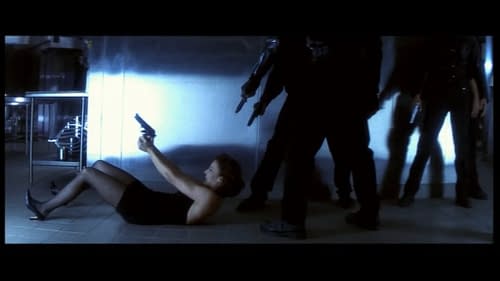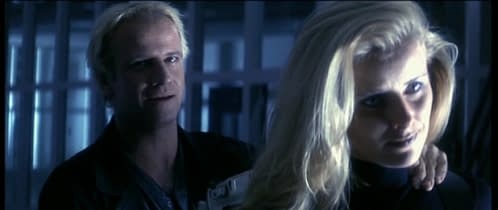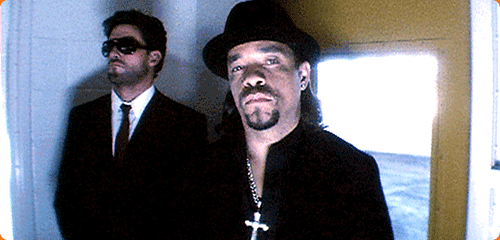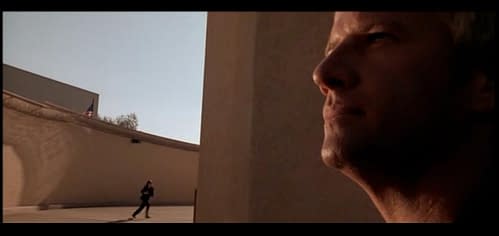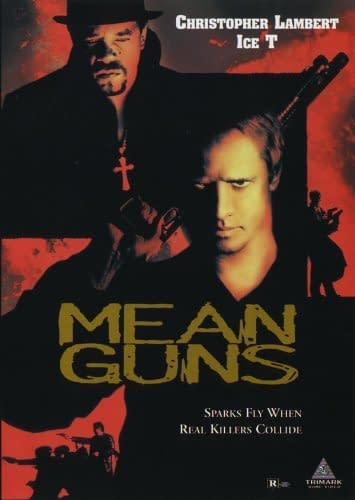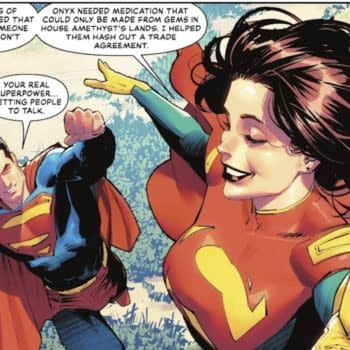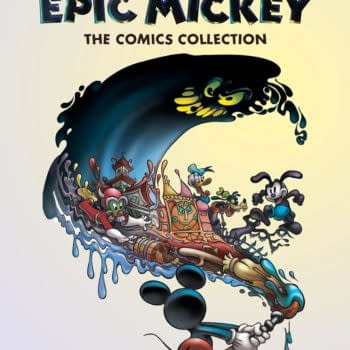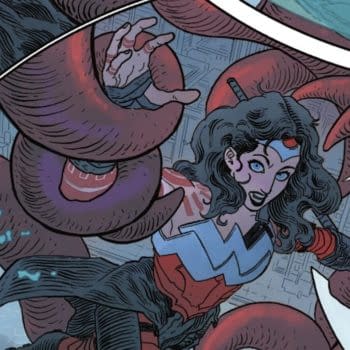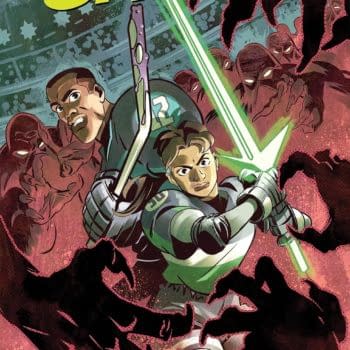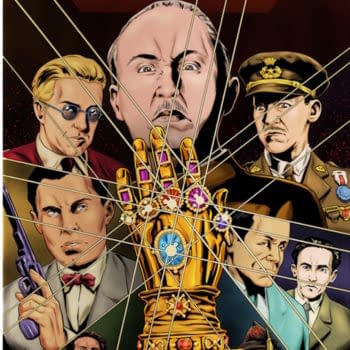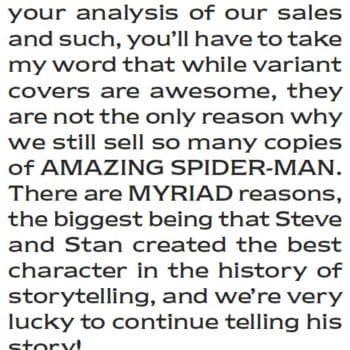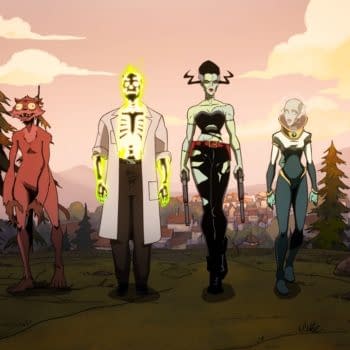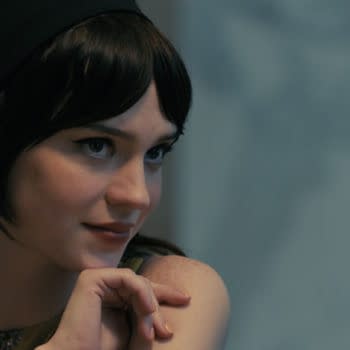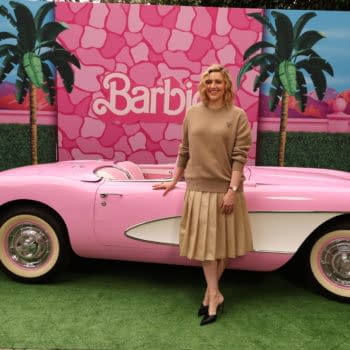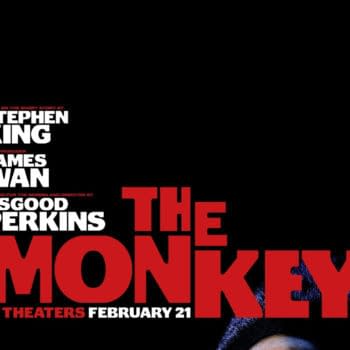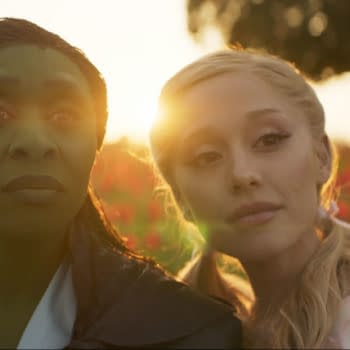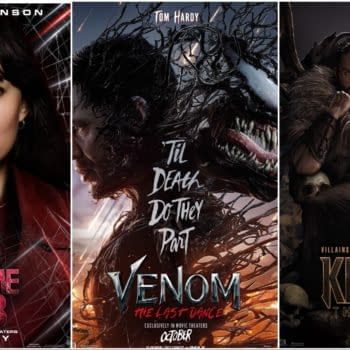Posted in: Movies | Tagged:
Look! It Moves! by Adi Tantimedh: The Guns Stay Mean After All These Years
[youtube]http://www.youtube.com/watch?v=Ahq0aQfmePU[/youtube]
[youtube]http://www.youtube.com/watch?v=K7ScvOp65Gk[/youtube]
This week, I present to you what I consider one of the best straight-to-cable genre thrillers of the 1990s: MEAN GUNS.
As movies get more generic and boring because studios and producers are loathe to spend too much money on anything that takes a risk these days, I look back on the 1990s with an increasing sense of bemused nostalgia. That was the time when I was in film school at NYU and indie movies of all shapes and sizes were plentiful. Not just the Sundance type of indie arthouse character dramas, but genre thrillers.
The 90s was a time when there was a lot of production money floating around all over the world, when producers could raise cash territory-by-territory from distributors, hedge funds, production funds drug lords, tax-dodge funds and various other strange and dodgy sources as long as their film had the desired Tarantino-type genre elements that guaranteed an audience, like guns, violence, tits and a popular star like Dolph Lundgren, Jean-Claude van Damme or Christophe Lambert.
Then there was the emergence of cable TV as an outlet where studios and producers could make back their money by selling movies because the channels needed content to fill their timeslots with. Thus HBO and Cinemax bought up and show a lot of B, C and Z-list genre movies because they were cheap to buy. Late-night HBO and Cinemax became the go-to place to see gratuitous violence and horrible-looking boob jobs being displayed in appallingly-stage sex scenes in an era before internet porn became easily available and widespread. Cable TV became a haven for genre thrillers of varying quality with a lot of increasingly familiar names in front of and behind the camera who never really graced the marquee of a movie theatre. One of these people was director Albert Pyun. Pyun began working in the 1970s before he had a hit with THE SWORD AND THE SORCERER in 1982 during the brief Sword & Sorcery craze brought on by the first CONAN THE BARBARIAN movie, then worked more or less steadily for the next two decades, with movies like CYBORG, which launched the career of Jean-Claude van Damme. He's almost a lost name in movie history because very few of his movies are now available on DVD, and the ones available are often in compromised form.
Many of Pyun's movies were made under difficult circumstances with low budgets or difficult stars or producers imposing restrictions, and in the age of social media and the internet, he and his parter Cynthia Curnan have set out to correct some of those wrongs by reclaiming some of his work and remastering them for re-release in the way they were always intended. MEAN GUNS is probably his best film. It's certainly his most technically-accomplished and the one where he said he managed to do everything he set out to do in a movie, despite the low budget and short shooting schedule. It had never been released in the way it was intended – it wasn't recut by the producers, but having only been shown in TV in the 90s, it was panned-and-scanned, which cut off half the image and visual storytelling since he had filmed it in 1:2.35 widescreen. Back then, before the advent of widescreen HD TVs, broadcasters and video companies barely gave a damn about presenting films the correct aspect ratio, which is something that everyone who cares about movies were constantly campaigning for.
I decided to put my money where my mouth is and buy a copy of the director's cut of MEAN GUNS because I felt it was worth revisiting. I've always been a believer in critic Manny Farber's theory of Termite Art, where low-brow or marginal forms of entertainment might contain unexpected poetry, artistry or genuine surprises. MEAN GUNS could be said to be a good example of Termite Art in the way it distills the 90s gunplay genre into a knowing, postmodern commentary on the pulp thriller movies of that decade.
The plot of MEAN GUNS is fairly simple: a crime syndicate lures a few dozen people they want dead – killers, pimps, con men, bikers, gangbangers – to a new prison facility before its opening and demands them kill each other, with the survivor walking away with a $10 million pay-off. This kicks off what amounts to a feature-length gunfight where the cast is narrowed down to noir archetypes that we're used to following: the world-weary hitman with a closely-guarded heart of gold, the wise-cracking bromance duo, the icy hitwoman, the dangerous psycho everyone's afraid of, the floozy whose airhead façade hides the most ruthless femme fatale in the room, the ordinary person who pissed off the mob.
The big shadow cast over action thrillers in the 90s wasn't Quentin Tarantino but John Woo, who popularized Peckinpah's fetished images of gunplay with his heroes looking as cool as possible while firing two guns at once and drawing out gunfights into balletic dances of macho grace. MEAN GUNS takes that convention and turns it into a feature-length farce, gleefully reveling in the absurdity of a bunch of bad people running around fighting over a limited number of guns to kill each other with. The movie is a compendium of noir and pulp references like the archetypes just mentioned, a play on hardboiled attitudes and plotlines distilled into the character's arcs, and there's even a nod to LONE WOLF AND CUB in Christopher Lambert's gleeful psycho and his relationship with the little girl who's his one shot at redemption. The use of wide shots and extreme close-ups are redolent of the Spaghetti Western in the way they're used to create a sense of space and tension before violence erupts. The movie was shot at the then newly-constructed Los Angeles County Prison in Downtown LA as a result of one of those surreal deals that can be struck in filmmaking, and the building is practically a character in itself. MEAN GUNS is also one of those cult movies that feature several career-best performances from actors we don't see often, and whom we wonder where they've since gone: Tina Cote is both funny and disturbing as the floozy-femme fatale. British character actor Michael Halsey has the kind of face that life has left its etchings on, and is subtle and low-key as the hitman increasingly weary of his world, and has since turned up in BROADWALK EMPIRE.
The audio commentary by Pyun is almost a masterclass in film production, especially when he talks about the practicalities of shooting coverage, using lights, pre-flashing filmstock to get a high-contrast look and use of framing in widescreen to tell a story, and the tricks of making full use of a rented location with major restrictions, economic use of set-ups for filming on a very short schedule, all invaluable lessons for any film student.
It's interesting to watch MEAN GUNS in the context of pulp culture being produced now. It's the type of story that may not be produced in movies now, but is exactly what's currently being published in comics by Vertigo, Top Cow and Image from writers like Ed Brubaker and Garth Ennis, as if comics were catching up with movies again in that strange cyclical way that pop culture mediums keep feeding off each other. In the current landscape of knowing, post-Tarantino, post-Woo pulp thrillers, MEAN GUNS got there first.
You can buy the Director's Cut of MEAN GUNS by emailing curnanpictures@gmail.com
There are no nice guns at lookitmoves@gmail.com
Follow the official LOOK! IT MOVES! twitter feed at http://twitter.com/lookitmoves for thoughts and snark on media and pop culture,
stuff for future columns and stuff I may never spend a whole column writing about.
Look! It Moves! © Adisakdi Tantimedh


